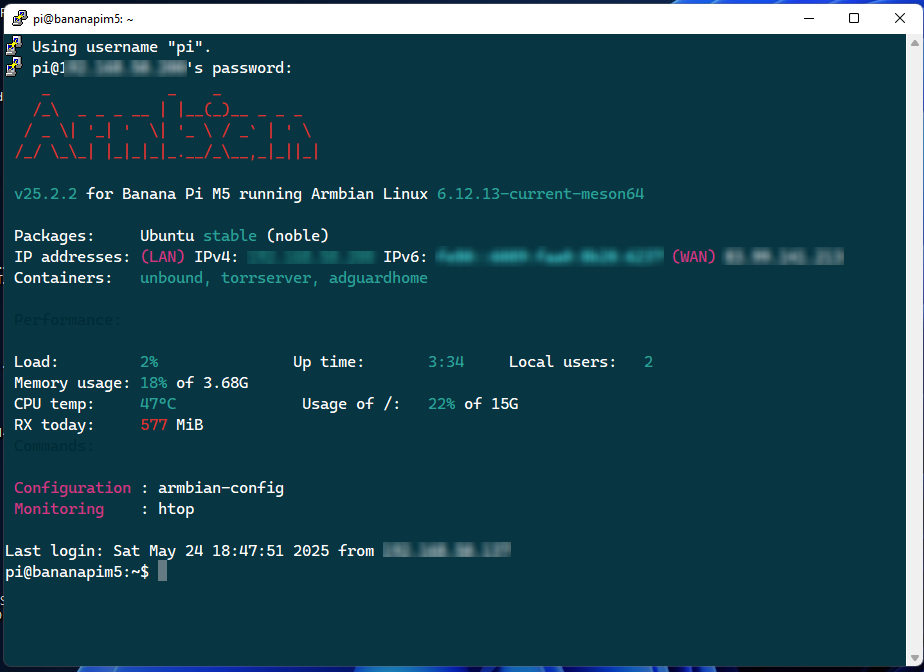All Activity
- Today
-
I'm using Bluetouch in my iPhone as a bluetooth mouse (rarely when needed) for my OrangePi/Armbian/Kodi setup. All fine with that… except… with my iPhone paired to the OrangePi, it also connects all its audio to the OrangePi, *all the time* when in range, unless I completely disable bluetooth from the iPhone. According to the only instructions I've found, I've tried setting [General] Enable= in `/etc/bluetooth/main.conf`, and restarting the bluetooth service, but the only effect this has is that there's no audible output. The phone still connects its audio to the box, just with no audible output. How to completely disable Armbian from advertising itself as a bluetooth audio device, while being able to connect bluetooth peripherals?
-
Using a 256G emmc and the server image v6.12 my Odroid N2+ doesn't boot. Here is the log. The Homeassistant image works. Would be nice to understand why it doesn't boot. <00><00><00>G12B:BL:6e7c85:2a3b91;FEAT:E0F83180:402000;POC:F;RCY:0;EMMC:0;READ:0;0. bl2_stage_init 0x01 bl2_stage_init 0x81 hw id: 0x0000 - pwm id 0x01 bl2_stage_init 0xc1 bl2_stage_init 0x02 L0:00000000 L1:00000703 L2:0000c067 L3:14000020 B2:00402000 B1:e0f83180 TE: 196470 BL2 Built : 06:17:13, Jun 28 2019. g12b gf0505d7-dirty - qi.duan@droid13 Board ID = 5 Set A53 clk to 24M Set A73 clk to 24M Set clk81 to 24M A53 clk: 1200 MHz A73 clk: 1200 MHz CLK81: 166.6M smccc: 000347a9 eMMC boot @ 0 sw8 s DDR driver_vesion: LPDDR4_PHY_V_0_1_14 build time: Jun 28 2019 06:17:09 board id: 5 Load FIP HDR from eMMC, src: 0x00010200, des: 0xfffd0000, size: 0x00004000, part: 0 fw parse done Load ddrfw from eMMC, src: 0x00060200, des: 0xfffd0000, size: 0x0000c000, part: 0 Load ddrfw from eMMC, src: 0x00038200, des: 0xfffd0000, size: 0x00004000, part: 0 PIEI prepare done fastboot data load 00000000 emmc switch 1 ok 00000000 emmc switch 2 ok fastboot data verify verify result: 255 Cfg max: 2, cur: 1. Board id: 255. Force loop cfg DDR4 probe ddr clk to 1320MHz Load ddrfw from eMMC, src: 0x00014200, des: 0xfffd0000, size: 0x0000c000, part: 0 00000000 emmc switch 0 ok Check phy result INFO : End of initialization INFO : End of read enable training INFO : End of fine write leveling INFO : End of read dq deskew training INFO : End of MPR read delay center optimization INFO : End of Write leveling coarse delay INFO : End of write delay center optimization INFO : End of read delay center optimization INFO : End of max read latency training INFO : Training has run successfully! 1D training succeed Load ddrfw from eMMC, src: 0x00020200, des: 0xfffd0000, size: 0x0000c000, part: 0 Check phy result INFO : End of initialization INFO : End of 2D read delay Voltage center optimization INFO : End of 2D write delay Voltage center optimization INFO : Training has run successfully! R0_RxClkDly_Margin==94 ps 8 R0_TxDqDly_Margi==106 ps 9 R1_RxClkDly_Margin==0 ps 0 R1_TxDqDly_Margi==0 ps 0 dwc_ddrphy_apb_wr((0<<20)|(2<<16)|(0<<12)|(0xb0):0001 2D training succeed auto size— 65535DDR cs0 size: 2048MB DDR cs1 size: 2048MB DMC_DDR_CTRL: 00600024DDR size: 3928MB cs0 DataBus test pass cs1 DataBus test pass cs0 AddrBus test pass cs1 AddrBus test pass pre test bdlr_100_average==425 bdlr_100_min==425 bdlr_100_max==425 bdlr_100_cur==425 aft test bdlr_100_average==425 bdlr_100_min==425 bdlr_100_max==425 bdlr_100_cur==425 non-sec scramble use zero key ddr scramble enabled 100bdlr_step_size ps== 425 result report boot times 0Enable ddr reg access 00000000 emmc switch 3 ok Authentication key not yet programmed get rpmb counter error 0x00000007 00000000 emmc switch 0 ok Load FIP HDR from eMMC, src: 0x00010200, des: 0x01700000, size: 0x00004000, part: 0 Load BL3X from eMMC, src: 0x0006c200, des: 0x0175c000, size: 0x0009aa00, part: 0 0.0;M3 CHK:0;cm4_sp_mode 0 E30HDR MVN_1=0x00000000 MVN_2=0x00000000 [Image: g12b_v1.1.3375-8f9c8a7 2019-01-24 10:44:46 guotai.shen@droid11-sz] OPS=0x40 ring efuse init chipver efuse init 29 0c 40 00 01 03 0d 00 00 07 39 31 4e 31 53 50 [0.019859 Inits done] secure task start! high task start! low task start! run into bl31 NOTICE: BL31: v1.3(release):ab8811b NOTICE: BL31: Built : 15:03:31, Feb 12 2019 NOTICE: BL31: G12A normal boot! NOTICE: BL31: BL33 decompress pass ERROR: Error initializing runtime service opteed_fast <debug_uart> serial_meson serial@3000: pincu U-Boot 2022.10-armbian-2022.10-S4deb-Pa713-H24ab-V6e0a-Bb703-R448a (Jan 24 2025 - 02:39:57 +0000) odroid-n2/n2-plus Model: Hardkernel ODROID-N2 SoC: Amlogic Meson G12B (S922X) Revision 29:c (40:2) DRAM: 3.8 GiB Core: 388 devices, 27 uclasses, devicetree: separate MMC: sd@ffe05000: 0, mmc@ffe07000: 1 Loading Environment from nowhere… OK In: serial Out: serial Err: serial Board variant: n2-plus Net: dwmac_meson8b ethernet@ff3f0000: Can’t get reset: -2 eth0: ethernet@ff3f0000 Hit any key to stop autoboot: 2 <08><08><08> 1 <08><08><08> 0 starting USB… Bus usb@ff500000: Register 3000140 NbrPorts 3 Starting the controller USB XHCI 1.10 scanning bus usb@ff500000 for devices… Failed to get keyboard state from device 1915:1047 3 USB Device(s) found scanning usb for storage devices… 0 Storage Device(s) found Device 0: unknown device Card did not respond to voltage select! : -110 unable to select a mode : -5 MMC Device 2 not found no mmc device at slot 2 Speed: 1000, full duplex BOOTP broadcast 1 DHCP client bound to address 192.168.1.179 (29 ms) *** Warning: no boot file name; using ‘C0A801B3.img’ Using ethernet@ff3f0000 device TFTP from server 192.168.1.1; our IP address is 192.168.1.179 Filename ‘C0A801B3.img’. Load address: 0x1000000 Loading: *<08>T T T T T T T T T T Retry count exceeded; starting again missing environment variable: pxeuuid Retrieving file: pxelinux.cfg/01-00-1e-06-42-56-3a Speed: 1000, full duplex Using ethernet@ff3f0000 device TFTP from server 192.168.1.1; our IP address is 192.168.1.179 Filename ‘pxelinux.cfg/01-00-1e-06-42-56-3a’. Load address: 0x1080000 Loading: *<08>T T T T T T T
-
Hi! I'm new here too. I tested my webcam using webcammictest.io, and it worked fine, so the hardware seems okay. If you're encountering the "Inappropriate ioctl for device" error with v4l2-ctl, it might be due to driver compatibility issues or kernel differences. You could try using a different Armbian version, like Jammy, to see if that resolves the problem
-
Hi there, I'm seeing the same while trying to update some U-Boot bootscripts on my Helios64 (rockchip aarch64). Seems there needs to be more space between $kernel_load_addr_r and $ramdisk_addr_r. How much is a bit puzzling, as for other archs it's usually enough to count the kernel's image size (and some alignment). If i come across something interesting, I will share here too. Groetjes,
- Yesterday
-
I could solve the instability problems and I am using the 2.5Gbit port now without having errors and with full speed! changing the swich Flow Control On for 2.5Gbit devices ethtool -K <LAN-device> sg off sudo ip link set dev <LAN device> mtu 9000 using the actual dtb file posted above cp rk3399-kobol-helios64.dtb /boot/dtb/rockchip/ update-initramfs -u nano /etc/default/cpufrequtils ENABLE=true MIN_SPEED=600000 MAX_SPEED=1800000 GOVERNOR=ondemand nano /etc/rc.local for cpufreqpolicy in 0 4 ; do echo 1 > policy${cpufreqpolicy}/ondemand/io_is_busy echo 25 > policy${cpufreqpolicy}/ondemand/up_threshold echo 10 > policy${cpufreqpolicy}/ondemand/sampling_down_factor echo $(cat policy${cpufreqpolicy}/cpuinfo_transition_latency) > policy${cpufreqpolicy}/ondemand/sampling_rate done for i in $(awk -F":" "/ahci/ {print \$1}" < /proc/interrupts | sed 's/\ //g'); do echo 10 > /proc/irq/$i/smp_affinity done for i in $(awk -F":" "/xhci/ {print \$1}" < /proc/interrupts | sed 's/\ //g'); do echo 20 > /proc/irq/$i/smp_affinity done exit 0 nano /usr/local/bin/make_nas_processes_faster.sh #!/bin/sh -e for i in `pgrep "iperf3|smb"` ; do ionice -c1 -p $i ; taskset -c -p 4 $i; done # >/dev/null 2>&1 running as a service
-
Is there a way to copy the system from sda1 [M2-Sata SSD (2280)] to emmc (uboot) from the running system without losing the configuration? If it's possible, how can I do this including configuring the changes? What is the maximum size for the M2-Sata SSD (2280)? https://wiki.kobol.io/helios64/m2/
-
Hello, With kernel 6.6.56-current-rockchip64 the audio works correctly: cat /proc/asound/cards 0 [RK809 ]: simple-card - Analog RK809 Analog RK809 1 [HDMI ]: simple-card - HDMI HDMI With kernel 6.12.30-current-rockchip64 the RK809 card is not available: cat /proc/asound/cards 0 [HDMI ]: simple-card - HDMI HDMI How can this be solved ? Thank you so much !
-

Build Image with Debian 12 VM on QubesOS
Werner replied to joejoe44's topic in Advanced users - Development
openssh-server should be installed by default on all images/configurations. -
thanks again, I'll do this soon.
-

Build Image with Debian 12 VM on QubesOS
joejoe44 replied to joejoe44's topic in Advanced users - Development
By exiting the docker container and installing qemu-user-static in the host system, I was able to run the build again and progress. Appreciate the tip thank you! One final issue that I notice is when I am attempting to use customize-image.sh to install openssh-server package. As you can see by these logs it reaches "Setting up openssh-server (1:9.2p1-2+deb12u6) ..." but then script hangs and never progresses. [🐳|🔨] Fetched 13.0 MB in 5s (2,701 kB/s) [🐳|🔨] Reading package lists... [🐳|🔨] Reading package lists... [🐳|🔨] Building dependency tree... [🐳|🔨] Reading state information... [🐳|🔨] The following additional packages will be installed: [🐳|🔨] libssl3 (3.0.16-1~deb12u1) [🐳|🔨] openssh-client (1:9.2p1-2+deb12u6) [🐳|🔨] openssh-sftp-server (1:9.2p1-2+deb12u6) [🐳|🔨] openssl (3.0.16-1~deb12u1) [🐳|🔨] Suggested packages: [🐳|🔨] keychain (2.8.5-3) [🐳|🔨] libpam-ssh [🐳|🔨] monkeysphere [🐳|🔨] ssh-askpass (1:1.2.4.1-16) [🐳|🔨] molly-guard (0.7.2) [🐳|🔨] ufw (0.36.2-1) [🐳|🔨] Recommended packages: [🐳|🔨] xauth (1:1.1.2-1) [🐳|🔨] The following packages will be upgraded: [🐳|🔨] libssl3 (3.0.15-1~deb12u1 => 3.0.16-1~deb12u1) [🐳|🔨] openssh-client (1:9.2p1-2+deb12u5 => 1:9.2p1-2+deb12u6) [🐳|🔨] openssh-server (1:9.2p1-2+deb12u5 => 1:9.2p1-2+deb12u6) [🐳|🔨] openssh-sftp-server (1:9.2p1-2+deb12u5 => 1:9.2p1-2+deb12u6) [🐳|🔨] openssl (3.0.15-1~deb12u1 => 3.0.16-1~deb12u1) [🐳|🔨] 5 upgraded, 0 newly installed, 0 to remove and 17 not upgraded. [🐳|🔨] Need to get 4,617 kB of archives. [🐳|🔨] After this operation, 1,024 B of additional disk space will be used. [🐳|🔨] Get:1 http://deb.debian.org/debian bookworm/main arm64 libssl3 arm64 3.0.16-1~deb12u1 [1,812 kB] [🐳|🔨] Get:2 http://deb.debian.org/debian bookworm/main arm64 openssh-sftp-server arm64 1:9.2p1-2+deb12u6 [60.7 kB] [🐳|🔨] Get:3 http://deb.debian.org/debian bookworm/main arm64 openssh-server arm64 1:9.2p1-2+deb12u6 [413 kB] [🐳|🔨] Get:4 http://deb.debian.org/debian bookworm/main arm64 openssh-client arm64 1:9.2p1-2+deb12u6 [937 kB] [🐳|🔨] Get:5 http://deb.debian.org/debian bookworm/main arm64 openssl arm64 3.0.16-1~deb12u1 [1,395 kB] [🐳|🔨] Preconfiguring packages ... [🐳|🔨] Fetched 4,617 kB in 1s (6,157 kB/s) (Reading database ... 26620 files and directories currently installed.)e ... [🐳|🔨] Preparing to unpack .../libssl3_3.0.16-1~deb12u1_arm64.deb ... [🐳|🔨] Unpacking libssl3:arm64 (3.0.16-1~deb12u1) over (3.0.15-1~deb12u1) ... [🐳|🔨] Preparing to unpack .../openssh-sftp-server_1%3a9.2p1-2+deb12u6_arm64.deb ... [🐳|🔨] Unpacking openssh-sftp-server (1:9.2p1-2+deb12u6) over (1:9.2p1-2+deb12u5) ... [🐳|🔨] Preparing to unpack .../openssh-server_1%3a9.2p1-2+deb12u6_arm64.deb ... [🐳|🔨] Unpacking openssh-server (1:9.2p1-2+deb12u6) over (1:9.2p1-2+deb12u5) ... [🐳|🔨] Preparing to unpack .../openssh-client_1%3a9.2p1-2+deb12u6_arm64.deb ... [🐳|🔨] Unpacking openssh-client (1:9.2p1-2+deb12u6) over (1:9.2p1-2+deb12u5) ... [🐳|🔨] Preparing to unpack .../openssl_3.0.16-1~deb12u1_arm64.deb ... [🐳|🔨] Unpacking openssl (3.0.16-1~deb12u1) over (3.0.15-1~deb12u1) ... [🐳|🔨] Setting up libssl3:arm64 (3.0.16-1~deb12u1) ... [🐳|🔨] Setting up openssl (3.0.16-1~deb12u1) ... [🐳|🔨] Setting up openssh-client (1:9.2p1-2+deb12u6) ... [🐳|🔨] Setting up openssh-sftp-server (1:9.2p1-2+deb12u6) ... [🐳|🔨] Setting up openssh-server (1:9.2p1-2+deb12u6) ... The command used in customize-image.sh to install is simply: apt-get install -y open-ssh Since I used the -y flag I don't think any user input is needed, so not sure yet what I am missing. Any tips are greatly appreciate as I troubleshoot. Other than this issue with openssh-server, the build worked out ok! I will write some guides and share for other Qubes OS users. -
chatgpt advised to type ":UTC" or ":Europe/Berlin" and it helped.
-
Same answer as above. Without serial logs impossible to debug. It leaves to mention that this board is not officially supported but configuration has been provided by a community effort. Board status is unknown to the core Armbian team.
-

Very simple module for nothing, Segmentation fault
going replied to Kopia's topic in Allwinner sunxi
No. Yes. This is the most stable and well-developed kernel. -
kernel_ramfs is located at /dev/block/mmcblk2p6 Have extracted with dd and copying through wifi adb. Interesting usb debugging is enabled in tvbox, but when connecting usb v3 cable to tvbox, host machine does not see the 'adb device', adb connection over wifi is ok. Has anybody used USB adb on this device?
-
No, that won’t work. This is a Armbian Linux forum. If you need android support try xda forums.
-
I also encountered the same situation. I wrote the Ubuntu Orange Pi 5 Max image from the Orange Pi homepage (http://www.orangepi.org/) and it ran normally, but when I wrote the Armbian Ubuntu version from https://www.armbian.com/orangepi-5-max/, the indicator light was only green and nothing appeared on the screen. I also tried writing the Armbian version for the regular Orange Pi 5 or Orange Pi 5 Pro and it could run (although wifi and usb were lost, but I could boot to the desktop), but when I wrote the Armbian version for the Orange Pi 5 Max, it did not run. Is it a bootloader problem?
-
I found that sun50i-h618-transpeed-8k618-t.dtb is the working one, can I replace boot.img-dtb in the android img with it?
-
@jwillb00 there’s a drop down menu on the first page. You’ll see “main” as the first option. Select “v20250306” that’s my more recent and stable release. you can clone my build using git command. git clone https://github.com/NickAlilovic/build.git -branch v20250306 kernel config is located here. Edit the configuration manually. https://github.com/NickAlilovic/build/blob/v20250306/config/kernel/linux-sunxi64-edge.config To compile a new image use the commands cd build ./compile.sh choose "Do not change kernel configuration" choose "Show CSC/WIP/EOS/TVB" choose "I understand and agree" choose "tanix-tx6s-axp313" choose "edge" rest is up to you. Your image should be in output/images directory.
-
@Nick AI have been using the TX6s build and it's been working great, but I was curious about the structure of your repository. I saw no files for the TX6s, but I see images for it in the releases? I'm new to all this, but I need to change some kernel config options so I was wondering how I could apply those to your repository.
-
Well, i have jumped ship on gone to every os i can think of that will run on RPI5 and now IM BACK!!!! Hello again, Jayson Here - And i have decided that Arbian 25 Noble Gnome may be the smallest-strongest multimedia build i can find...so its what i will choose to finish my PI 5 with. I am still wrestling with the sony IMX477 as to produce video. I have just ordered a usb mount for uvc-video rather than csi/cam0-cam1 b/c i cant get it working. at all and need to advance... to the touchscreen which is still just HDMI w/o touch. on the new download of Armbian. its downloading now. I will put pics of the device and more tomorrow. Jay T.





